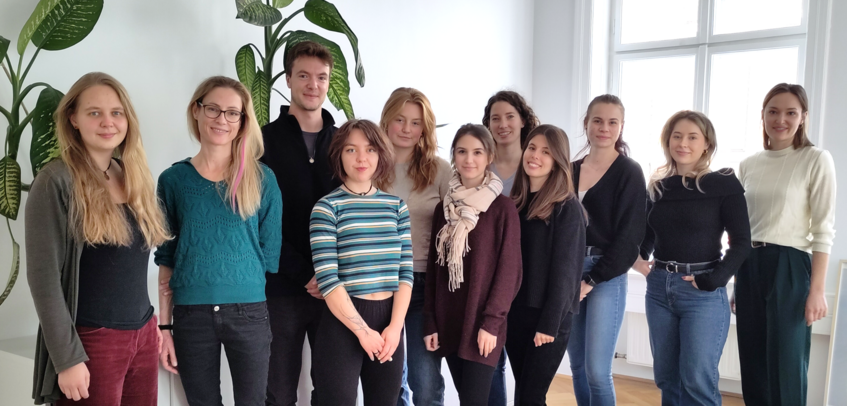Intellectual Disabilities

Our research group focuses on people with intellectual disabilities. We address questions regarding mental health, models of positive psychology, theories of self-determination or quality of life. In the field of clinical psychology we focus on the development of strategies and methods for early detection of mental disorders or challenging behaviour. The human rights perspective acts as the social meta-framework of our research contributions.
Our Team

Team of the Working Group Intellectual Disability f.l.t.r.: Paula Moritz, Elisabeth Lucia Zeilinger, Sebastian Kabas, Nadine Brunevskaya, Louise Hillenkamp, Sarah Jasmin Landskron, Sophie Komenda-Schned, Alma Herscovici, Julia Lehner, Lisa Steiner, Theresa Wagner, (Charlotte Schomburg)
Current Projects
Project: Mental Health and Intellectual Disabilities
People with intellectual disabilities (ID) experience major health inequalities and face multiple barriers and obstacles regarding their health and health care. Like those without ID, people with ID can be mentally ill or mentally healthy. Yet, there is no common understanding or definition of positive mental health in people with ID, which impairs the validity and significance of research on this topic and ultimately limits the quality of mental health care, treatment, assessment, and mental health promotion activities. This contributes heavily to the inequalities regarding mental health in people with ID and is in direct conflict with the Convention on the Rights of Persons with Disabilities by the United Nations (UN-CRPD).
The primary goal of the present project is to develop and provide the first definition of positive mental health in people with ID using a novel participatory approach.
Principal Investigator: Maga Drin Elisabeth Zeilinger
Project Term: 16.01.2023 - 15.01.2026
Contact: dis-ability.psychologie@univie.ac.at
Current Projects
Project: Breast cancer screening in women with intellectual disabilities
People with intellectual disabilities (ID) experience many barriers regarding their health and health care. Breast cancer is the most common cancer with the highest mortality rate among women, whereas national breast cancer screening programs have proven to be effective. However, international data suggests that women with ID are less likely to participate in screening programs and breast cancer is often diagnosed at a late stage, which is associated with a poorer prognosis and results in higher mortality rates.
In Austria, there is no data available regarding the participation of women with ID in the national breast cancer screening program, nor regarding relevant factors that facilitate or hinder participation.
The aims of the project are to determine the participation rate of women with ID in the Austrian breast cancer screening program, to gather factors that facilitate as well as hinder participation and to identify needs for successful participation.
Principal Investigator: Maga Drin Elisabeth Zeilinger
Project Term: 01.11.2023 - 31.10.2025
Contact: prev-id.psychologie@univie.ac.at
Current Projects
Project: Quality of life among people with intellectual disabilites in accommodation facilites at HABIT
People with intellectual disabilities (ID) face unique challenges in their everyday life. Therefore, the task of social institutions is to develop specific measures, to evaluate and adapt them accordingly. The Haus der Barmherzigkeit Integrationsteam (HABIT) has the task of regulary assessing the quality of life of residents in an appropriate manner. The clients supported by HABIT are primarily people with severe intellectual disabilites, whereas there are no methods for assessing the quality of life of people with these needs.
The aim of the project is to record quality of life in a way that is specially adapted to the target group, in order to ensure that the current situation and the needs of HABIT residents can be represented as accurately and truthfully as possible.
Principal Investigator: Maga Drin Elisabeth Zeilinger
Project Partners: Forschungsgruppe Medizin SBG; Fakultät für Psychologie, Universität Wien; Akademie für Altersforschung am Haus der Barmherzigkeit; Haus der Barmherzigkeit Integrationsteam (HABIT)
